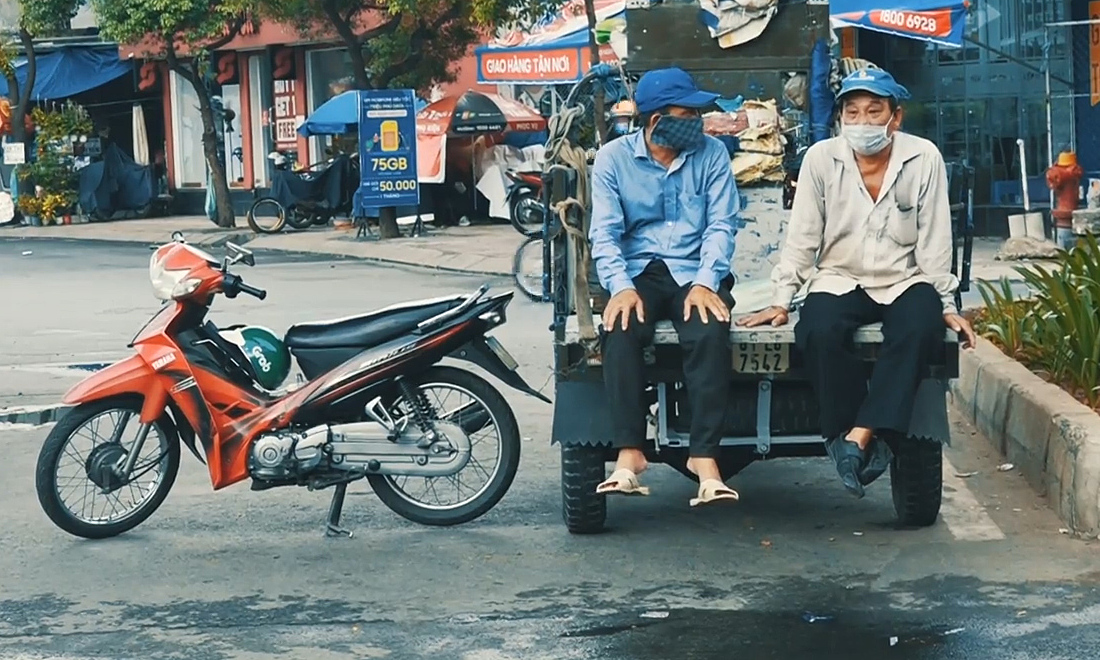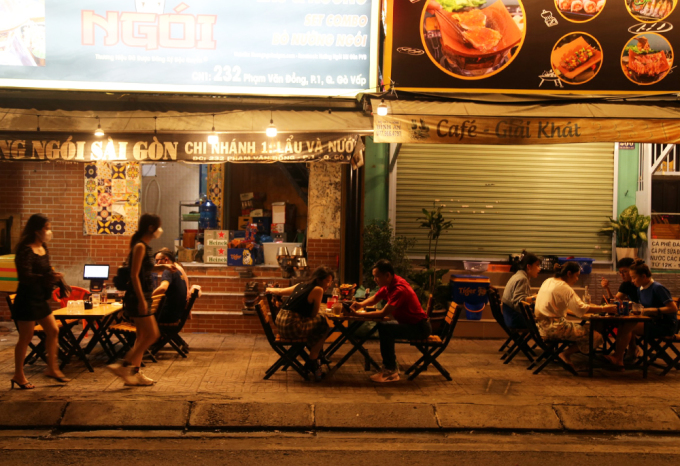A high vaccination rate and acceptance of Covid-19’s likely endemicity allow Saigonese to remain calm and get on with their lives even when neighbors and friends get infected.
Truong Thi Thu Hanh, 45, of Ho Chi Minh City’s District 5 was not scared or worried when she came to know her next-door neighbor had just tested positive for the coronavirus since she herself is fully vaccinated and strictly follows safety guidelines.
One day in December Hoa woke up early and opened her pho restaurant in an alley off Nguyen Chi Thanh Street.
But when she closed it at noon at usual, she did not head straight home, but instead went to a nearby market and bought some fruits for her infected neighbor.
She says: “I am not scared of Covid and I have learned to live with it. I refuse to let it dictate my life any longer”. She placed the bag of fruits in front of her neighbor’s house, which has a sign in front saying ‘A family member undergoing quarantine’.
“We must remain calm and care for others during this tough time”.
 |
|
Two men chat with each other on a street in HCMC. Photo by VnExpress/Vu Tuan |
Epicenter HCMC has had over 487,000 Covid cases in the ongoing outbreak and is now reporting around 1,000 cases a day, but most people remain composed and are going about with their lives.
Nguyen Thanh Long of District 3 came to know that two of his colleagues with whom he had lunch a few days earlier had got infected in early December.
“After hearing the news, I bought test kits and tested myself,” the office worker in District 1 says.
If he had tested positive, he would not have minded quarantining himself and notifying his friends, he adds matter-of-factly.
Many people show support for neighbors and friends who contract Covid instead of avoiding and stigmatizing them.
Le Pham Thu Huong of District 7 says when she saw the red color sign saying ‘This house has a Covid patient in home quarantine’ in front of her neighbor’s house, she “called to ask if he is fine and needed any help”.
In many companies and buildings where Covid patients have been found in the last few weeks, employees go to work as usual and get tested regularly. In many markets and on streets near Covid patients’ houses, stores remain open and carry on business as usual.
Le Thi Ly, a fruit vendor on Trang Tu Street, District 5, where some houses have Covid patients at home and warning signs, says: “I sanitize my hands regularly and never take off my mask. I am not worried I will get the virus or have severe symptoms”.
Ward 14 in District 5 continues to detect new cases every day.
Le Vinh Phu, head of its health station, told Thanh Nien newspaper that as of Dec. 9 there were 45 patients staying at home, mostly without severe symptoms and all regularly monitored by ward staff.
“When a patient is found, we disinfect and do contact tracing to prevent the spread of the virus. Houses with an infected people have to put up a sign and tie a rope (to cordon the house off)”.
People doing business and living around the houses are comfortable and no longer afraid because most of them have been vaccinated and gradually adapted to the pandemic, he added.
 |
|
A food establishment on Pham Van Dong Street, HCMC’s Go Vap District, Nov. 28, 2021. Photo by VnExpress/Dinh Van |
Getting on with lives
The pandemic has changed life. Though the highly transmissible Delta variant continues to spread, Saigonese have learnt not to let it disrupt their lives.
Nguyen Huu Cuong, a District 1 resident whose entire family is vaccinated, says: “I know Covid is still a threat. But I have learned that fully vaccinated people only experience mild symptoms, so I am less frightened by the virus”.
A survey of 349 patients at the HCMC Hospital for Tropical Diseases in October found only 12 percent of fully vaccinated people having severe symptoms.
As of Friday, 94 percent of 7.2 million people in the southern metropolis have been fully vaccinated.
Becoming reconciled to living with the virus is another factor that puts Saigonese at ease.
Like many other countries, Vietnam has changed its strategy to one of adapting and coexisting with Covid-19.
Prime Minister Pham Minh Chinh said on Sept. 1 that lockdowns cannot go on forever, and the goal should be adapting to the pandemic and reducing death rates through vaccination and drugs.
Since HCMC rescinded its stay-at-home orders on Oct. 1 it has gradually regained its vibrancy: Many eateries can allow in diners and schools will reopen for ninth and 12th graders this week.
Phan Thi Ngoc Linh, an office worker District 1, says: “I think we should accept that the virus is here to stay. So we have to move on”.
She adds that she cannot live under lockdown or stay at home forever.
Recently the city Department of Health instructed all hospitals to set aside areas and at least 10 percent of their beds for treating Covid patients as the disease resurged.
Experts said the increase in incidence was only to be expected since the city had resumed almost all socio-economic activities on Oct. 1 after four months of restrictions.
“I still go to church and see my friends like I did before the lockdown,” Hanh says.
“The pandemic has lasted for nearly two years, and posed enough ordeals to our lives already. It is time to shake it off and get our lives back”.
- Reduce Hair Loss with PURA D’OR Gold Label Shampoo
- Castor Oil Has Made a “Huge” Difference With Hair and Brow Growth
- Excessive hair loss in men: Signs of illness that cannot be subjective
- Dịch Vụ SEO Website ở Los Angeles, CA: đưa trang web doanh nghiệp bạn lên top Google
- Nails Salon Sierra Madre
 VnExpress News The News Gateway of Vietnam
VnExpress News The News Gateway of Vietnam





